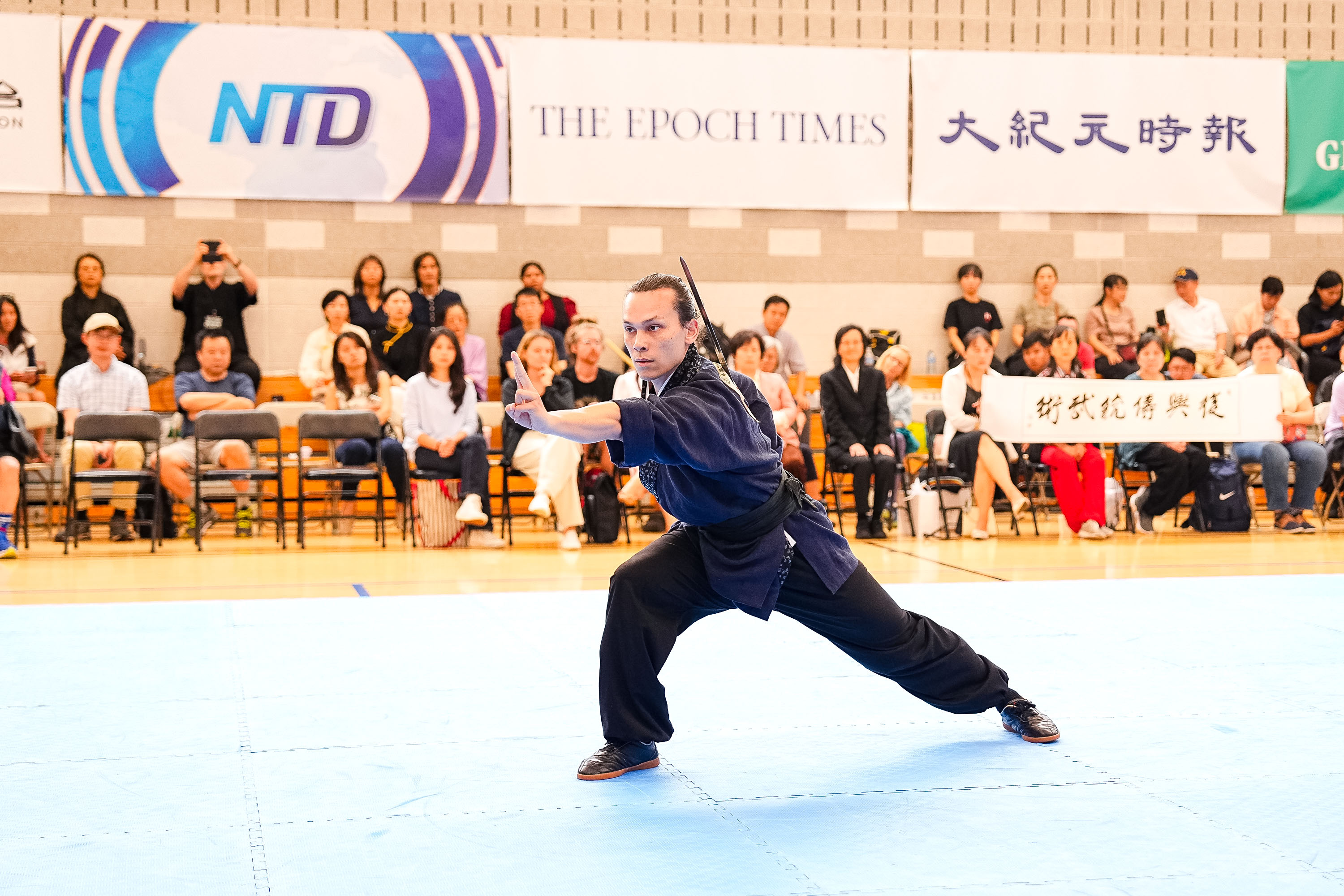WALDWICK, N.J.—Sixteen years ago, martial arts master Youfu Li began chairing the NTD International Traditional Chinese Martial Arts Competition in a shared mission to revive an art form that had been reduced to ashes. This year, he saw new growth and a vision of what may one day bear fruit.
NTD, a television station founded by Chinese Americans who fled communism, stands for New Tang Dynasty, a reference to China’s golden age. The competition is meant to revive traditional Chinese martial arts, which was all but lost when China fell to communism and then deliberately destroyed by the Chinese Communist Party (CCP) during and after the Cultural Revolution. From Aug. 30 to Sept. 2, 91 martial artists gathered in Waldwick, New Jersey, for the 8th NTD International Traditional Chinese Martial Arts Competition.
What remains today are some of the physical movements and routines of some traditional styles, but there are precious few teachers who can teach the original way to execute them along with the mental and spiritual component and philosophy behind the movements, much less the secret techniques of those styles, which were never written down.
“Traditional martial arts is completely lost today, and no one does them in their original form anymore,” Li said.
These may sound like harsh words from a competition judge whose mission is to revive the art, but, he says, “if we still had these arts, well, then I wouldn’t need to do this to try to revive them.”
Case in point: In 2022, Li stunned the participants by announcing there would be no gold prize winner. Martial artists had traveled from far and wide to participate, and it was far from typical for a martial arts competition to leave its top prize unawarded.
Li explained his standards and vision and implored the crowd to strive toward attaining the essence of the true traditional Chinese martial arts.
This year, the competition awarded two gold medals.
Martial Virtue
The essence of traditional martial arts is “martial virtue,” which Li says provides martial artists with a roadmap that can guide their practice of martial arts to higher realms, even one day surpassing the lost original forms.“Martial virtue is preventing the evil and promoting the good,” said Eike Opfermann, who won the gold prize in the men’s weapons category with the qimen sword. “It’s also not being afraid in the face of evil, and not deceiving in the face of good, and to be humble.”
“These are like the general terms, they give you what to strive for. Then you try to embody this in your whole daily life,” he said. “It comes to loyalty, it comes down to compassion, it comes down to tolerance, truthfulness, all these real, traditional values.”
Opfermann grew up in a martial arts household and began practicing traditional Chinese martial arts at age 8, but then stopped at 18 to play other sports. His peers would ask him how he was able to do so well in a new sport, and Opfermann realized what a strong foundation martial arts had given him. Traditional Chinese martial arts styles are methods of movement built upon a deep understanding of the human body, and each style has a philosophy behind the movements.
“It’s actually something that trains and develops you,” he said. “Wushu [martial arts] actually gives me the most sensational freedom; I feel free in my movement, and that reflects in my mind and my body.”
Opfermann returned to martial arts with a newfound appreciation for the art, and for martial virtue.
“You’re a martial artist not only when you’re on stage, not only when you’re practicing, you’re a martial artist the whole time,” he said. “When you’re asleep you’re a martial artist, if you’re at work you’re a martial artist, if you train you’re a martial artist.”

Eike Opfermann participates in the NTD International Traditional Chinese Martial Arts Competition finals in Waldwick, N.J., on Sept. 2, 2024. (Larry Dye/The Epoch Times)

Ellen Opfermann participates in the NTD International Traditional Chinese Martial Arts Competition finals in Waldwick, N.J, on Sept. 2, 2024. (Larry Dye/The Epoch Times)

Sophie Li participates in the NTD International Traditional Chinese Martial Arts Competition finals in Waldwick, N.J., on Sept. 2, 2024. (Larry Dye/The Epoch Times)
Effecting a Renaissance
“Actually, we’re not just seeking to recover these arts. We are trying to create a renaissance,” Li said.If Li succeeds, he will have made history.
Born in the 1960s, Li’s first martial arts teacher taught him while under house arrest by the communists. While in China, Li saw—and sparred—the class of martial artists who could perform seemingly impossible feats. But he also saw the destruction of the art, as the CCP coopted these ancient forms and used the physical techniques to train fighters and athletes, claiming these contemporary forms were true martial arts.
Contemporary martial arts don’t teach martial virtue, and as a result, they also lack the mental and spiritual foundation that makes traditional martial arts a study of the human body’s potential. These practitioners are instilled with neither a requirement to never harm an innocent, nor the knowledge of how to prevent their own injuries.
After several violent communist campaigns to wipe out all traditional Chinese arts, few traditional martial artists were left, and even fewer who knew those secret techniques passed down from master to disciple over millennia. Some fled to the mountains in hopes of keeping their secrets for a later generation, Li said, but in recent years, these martial artists in their 80s or older have passed away one by one.

Jury chair Li Youfu speaks at NTD’s 8th International Traditional Chinese Martial Arts Competition in Waldwick, N.J., on Aug. 30, 2024. (Samira Bouaou/The Epoch Times)
Li, a traditional Chinese medicine doctor by trade, has spent many years on his mission to revive traditional Chinese martial arts, giving talks about martial virtue to martial arts communities around the world.
In 2008, he found a partner in NTD. The competition has provided a platform that has brought together martial artists from around the world, and inspired them toward the path of tradition.
Ta-yen Liu won gold in the men’s weapons category in 2019, which meant he would no longer be competing again in that category in future competitions. In 2022, he participated in the unarmed category and won a bronze medal.
That year, when Li said there would be no gold prize, it had the intended effect on Liu. Although surprised at first, Liu was inspired by the high expectations Li had for everyone and set out to improve even more than he had originally intended. On Sept. 2, Liu won the gold in the men’s unarmed category using the xingyi style.

Ta-yen Liu participates in the NTD International Traditional Chinese Martial Arts Competition finals in Waldwick, N.J., on Sept. 2, 2024. (Larry Dye/The Epoch Times)
“My goal is to reach the levels of those legendary old masters, and then new heights,” Liu said.
Liu is from Taiwan, where Chinese martial arts are practiced widely; he grew up reading popular fictionalized stories about ancient martial arts heroes and took martial arts classes at an after-school program. It wasn’t until he met a teacher who had grown up in a Shaolin village and really impressed Liu with his skill and reserved character that Liu thought about taking it seriously. It was later yet that Liu attended a talk by Li and better understood the loss of traditional martial arts and the mission to revive them.
Today, Liu is also a martial arts teacher and sees students of all ages. People generally come to learn it as a form of exercise, or because they have some interest in martial arts, he said, but as they practice and see benefits in their physical fitness, mental fortitude, emotional stability, and many other things, people generally also come to have an interest in martial virtue, or learning more deeply about traditional Chinese culture.
A renaissance will take time, people who want to learn, enough of the right teachers, facilities, and many resources, Liu said. But Li and the NTD competition as a platform have laid a foundation to make one possible, he said, and he is committed to helping it along.

En-Ruei Yang participates in the NTD International Traditional Chinese Martial Arts Competition finals in Waldwick, N.J., on Sept. 2, 2024. (Larry Dye/The Epoch Times)

Amy Li participates in the NTD International Traditional Chinese Martial Arts Competition finals in Waldwick, N.J., on Sept. 2, 2024. (Larry Dye/The Epoch Times)
Toward Tradition
Shao-Hsuan Chen won bronze in both the 2019 and 2022 competitions in the men’s weapons category, and this time was awarded the silver.In both those previous competitions, Chen said he had added some movements to his routines to make his performance more entertaining. Then in 2022, Li told him after the competition that the NTD competition values traditional martial arts, and keeping things true to form. That was a bit of a wake-up call for Chen.
“I reflected on being swayed by these modern styles, and how far I'd strayed from my original path,” Chen said.

Shao-Hsuan Chen participates in the NTD International Traditional Chinese Martial Arts Competition finals in Waldwick, N.J., on Sept. 2, 2024. (Larry Dye/The Epoch Times)
Chen said he was a bit of a naughty kid who got into fights, but that led to his being enrolled in martial arts classes, which led to a shift in how he saw the use of force. What attracted him to traditional Chinese martial arts was the peaceful state it required, yet not to the detriment of other aspects, such as strength, agility, or force.
But Chinese martial arts competitions today have diluted the value of traditional Chinese martial arts, Chen said. He’s participated in competitions big and small, all across Taiwan and in China. Out of all of these, NTD’s is the only one that has held fast to its mission of reviving tradition, he said.
“This is the right path,” he said. “And to use a competition form to do this, this has an impact on us martial artists and changes the direction for us martial artists.”
Chen says it’s the right path because of traditional martial arts’ emphasis on martial virtue. From the perspective of a martial artist, who in ancient times would have been a soldier, the knowledge that you have the ability and strength to take a life shows you how fragile human life is, leading one to have the determination to protect, he said. And when you realize you have the strength and ability to protect yourself, you also gain the realization that you can never be cornered and, therefore, need not have fear, he said.
Chen said there was an incident in Taiwan not long ago, where an assailant pulled a knife in a public place, and a man tried to stop him barehanded. The assailant was eventually subdued by a group of people together, and no one came to harm. Afterward, some in the martial arts community called on those who were able to proactively help those who were unable to defend themselves. This proved divisive, with online backlash from those who thought this was dangerous advice.
“Of course, no one is telling people to go after people with weapons barehanded,” Chen said. “But in Taiwan, there are so many people who know martial arts ... where is the willingness to stop evil? To protect the innocent?”
“I hope everyone studying martial arts can have some positive effect,” Chen said.

Majoa Chaux Rojas participates in the NTD International Traditional Chinese Martial Arts Competition finals in Waldwick, N.J. on Sept. 2, 2024. (Larry Dye/The Epoch Times)
It may be several generations before one can look back and declare without a doubt that a renaissance has occurred, but no matter how many years it might be before a martial artist indeed reaches or surpasses the level of the old masters or obtains those lost techniques, it’s clear that Li has already created a positive ripple effect.
Last year, the Fuxin College opened in Southern California with a mission to revive traditional Chinese martial arts, and Li played an instrumental role.
Wendy Wang, bronze medalist in the female weapon’s category with the qimen sword, said she actually found out about the school fortuitously one day before it opened. She signed up her daughter, her young son, and herself, and has been practicing martial arts for about one year now.
“The transformation has been huge,” she said.

Wendy Wang participates in the NTD International Traditional Chinese Martial Arts Competition finals in Waldwick, N.J., on Sept. 2, 2024. (Larry Dye/The Epoch Times)
Wang said she wanted her children to participate because she wanted them to benefit from traditional culture, and for her own fitness. Those benefits manifested quickly. For her children, the change is obvious in their strength, mobility, and openness both in physical bearing and character, she said. In herself, liver and kidney problems cleared up, her posture changed, and she could feel a nerve running from head to gut activating and functioning optimally.
“It’s completely different from contemporary martial arts this is a holistic study of the human body, also connected to the study of life, nature, and the universe,” she said. “It’s upright and righteous, and you gain the ability to learn and grasp even very complex things really quickly. Mentally, spiritually, physically, there’s an obvious rejuvenation.
“You’re very alert. It comes, I think, from the training of stillness amid motion,” Wang said. “Actually I think it’s extremely relevant for us living in this modern world.”

Armilali Pinzon participates in the NTD International Traditional Chinese Martial Arts Competition finals in Waldwick, N.J., on Sept. 2, 2024. (Larry Dye/The Epoch Times)
Sarah Lu and Juliet Song contributed to this report.









